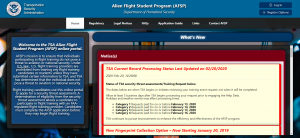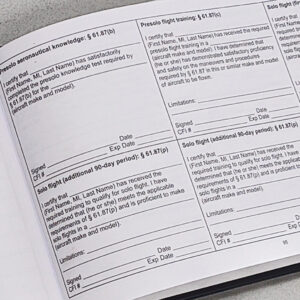 Flight instructors carry one of the most important responsibilities when it comes to pilot certification – single-pilot endorsements. A CFI represents the FAA when they serve as an evaluator, and their role is crucial. A CFI’s pen carries the ability to authorize student pilots to exercise their solo privileges for the first time and operate as pilot in command. Beyond solo flight, CFIs endorse pilots for a variety of reasons, including practical tests, additional privileges, and recurrent training. But to grant an endorsement to another pilot, a CFI’s must properly fill out their student’s logbook.
Flight instructors carry one of the most important responsibilities when it comes to pilot certification – single-pilot endorsements. A CFI represents the FAA when they serve as an evaluator, and their role is crucial. A CFI’s pen carries the ability to authorize student pilots to exercise their solo privileges for the first time and operate as pilot in command. Beyond solo flight, CFIs endorse pilots for a variety of reasons, including practical tests, additional privileges, and recurrent training. But to grant an endorsement to another pilot, a CFI’s must properly fill out their student’s logbook.
The myriad endorsements you are required to provide to a new flight student can be difficult to figure out. This guide is meant to help you determine what is required depending on your student’s nationality, the time of day, the airspace the training will be conducted, etc. All sample endorsements in this guide can be found in Appendix A of AC 61-65H.
NOTE: This guide is applicable to the initial private pilot training of a U.S. citizen in a single-engine airplane. Information regarding training in other categories and classes can be found in the relevant subparts within the sections listed below. This guide is up-to-date as of publication. Due to the ever-changing nature of Federal Aviation Regulations, verify the relevance of the information provided in this guide by checking the most recent regulations and the current version of AC 61-65H before relying on any instruction.
Citizenship Verification
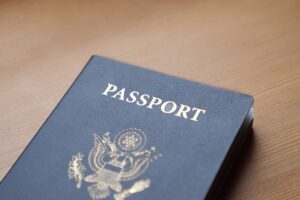 Prior to starting flight training, instructors are required by 49 CFR 1552.3(h) to verify a potential student’s Citizenship and keep a record of his or her unexpired U.S. passport, U.S. birth certificate, or any other approved documents for 5 years.
Prior to starting flight training, instructors are required by 49 CFR 1552.3(h) to verify a potential student’s Citizenship and keep a record of his or her unexpired U.S. passport, U.S. birth certificate, or any other approved documents for 5 years.
I certify that [First name, MI, Last name] has presented me a [type of document presented, such as a U.S. birth certificate or U.S. passport, and the relevant control or sequential number on the document, if any] establishing that [he or she] is a U.S. citizen or national in accordance with 49 CFR Sec. 1552.3(h).
If the student is an alien flight school candidate, a logbook endorsement is not required, but TSA approval is through www.flightschoolcandidates.gov. This process goes beyond the scope of this guide.
Pre-Solo Endorsement
Before a student is allowed to fly solo, an instructor-administered aeronautical knowledge test must be conducted according to 14 CFR 61.87(b). In this guidance from the Air Safety Institute, the test should be given in two parts: a closed-book written quiz and an open-book take home test. This will ensure the student has the required knowledge before going on his or her first solo flight. Gleim includes a convenient pre-solo knowledge test in our syllabus. At the conclusion of the test, the instructor must review all incorrect answers with their student.
I certify that [First name, MI, Last name] has satisfactorily completed the pre-solo knowledge test of Sec. 61.87(b) for the [make and model] aircraft.
Note: A separate endorsement is required for each make and model that a student intends to fly solo.
First Solo Endorsements
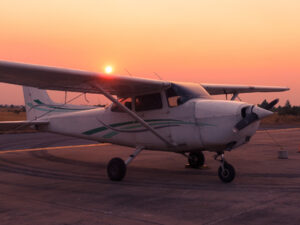 Prior to a student’s first solo flight, their instructor must ensure the endorsements below are in the student’s logbook.
Prior to a student’s first solo flight, their instructor must ensure the endorsements below are in the student’s logbook.
Assuming the first solo is to be conducted during the day, an instructor must endorse their student’s logbook according to 14 CFR 61.87(c), certifying that the student has received and logged the training required and has demonstrated satisfactory proficiency.
I certify that [First name, MI, Last name] has received and logged pre-solo flight training for the maneuvers and procedures that are appropriate to the [make and model] aircraft. I have determined [he or she] has demonstrated satisfactory proficiency and safety on the maneuvers and procedures required by Sec. 61.87 in this or similar make and model of aircraft to be flown.
An initial 90-day endorsement must be signed in the student’s logbook for the make and model of the aircraft flown by the instructor who provided the training, 14 CFR 61.87(n).
I certify that [First name, MI, Last name] has received the required training to qualify for solo flying. I have determined [he or she] meets the applicable requirements of § 61.87(n) and is proficient to make solo flights in [make and model].
The endorsement above is only valid for 90 days. If solo flight is necessary beyond this initial period, the instructor is required to provide more training and update the student’s logbook with 14 CFR 61.87(p) every 90-days thereafter.
I certify that [First name, MI, Last name] has received the required training to qualify for solo flying. I have determined that [he or she] meets the applicable requirements of Sec. 61.87(p) and is proficient to make solo flights in [make and model].
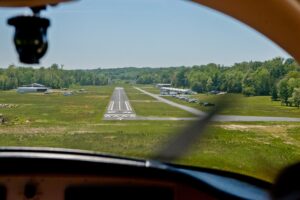 Solo Flight to Another Airport Within 25 NM
Solo Flight to Another Airport Within 25 NM
14 CFR 61.93(b)(1) requires an instructor to endorse their student’s logbook for solo takeoffs and landings at another airport within 25 NM. The purpose of the flight is to practice takeoffs and landings at a different airport.
I certify that [First name, MI, Last name] has received the required training of Sec. 61.93(b)(1). I have determined that [he or she] is proficient to practice solo takeoffs and landings at [airport name]. The takeoffs and landings at [airport name] are subject to the following conditions: [List any applicable conditions or limitations.]
Solo Cross-Country Endorsements
According to 14 CFR 61.1(ii), cross-country time for the purpose of private pilot certification means flying to an airport that is more than 50 NM straight-line distance from the point of departure. When a student is prepared to make a solo cross-country flight, their instructor must endorse the student’s logbook with the category, make, and model of the aircraft being flown according to 14 CFR 61.93(c)(1) and (2).
I certify that [First name, MI, Last name] has received the required solo cross-country training. I find [he or she] has met the applicable requirements of Sec. 61.93, and is proficient to make solo cross-country flights in a [make and model] aircraft, [aircraft category].
Additionally, the instructor must review their student’s cross-country plan with regards to his or her navigation log, weather research, airport information, applicable endorsements, and endorse the student’s logbook to comply with 14 CFR 61.93(c)(3). This endorsement need not be provided by the student’s primary instructor.
I have reviewed the cross-country planning of [First name, MI, Last name]. I find the planning and preparation to be correct to make the solo flight from [origination airport] to [origination airport] via [route of flight] with landings at [names of the airports] in a [make and model] aircraft on [date]. [List any applicable conditions or limitations].
If repeated solo cross-country flights to an airport within 50 nautical miles are to be made over the same route, an endorsement to comply with 14 CFR 61.93(b)(2) is required in the student’s logbook.
I certify that [First name, MI, Last name] has received the required training in both directions between and at both [airport names]. I have determined that [he or she] is proficient of Sec. 61.93(b)(2) to conduct repeated solo cross-country flights over that route, subject to the following conditions: [List any applicable conditions or limitations.]
Flights within Class B Airspace
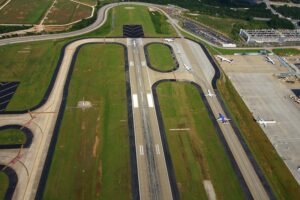 If a student’s solo flight will be made through Class B airspace, their instructor will need to provide ground and flight training in that specific Class B airport and provide an endorsement that is valid for 90 days, according to 14 CFR 61.95(a).
If a student’s solo flight will be made through Class B airspace, their instructor will need to provide ground and flight training in that specific Class B airport and provide an endorsement that is valid for 90 days, according to 14 CFR 61.95(a).
I certify that [First name, MI, Last name] has received the required training of Sec. 61.95(a). I have determined [he or she] is proficient to conduct solo flights in [name of Class B] airspace. [List any applicable conditions or limitations.]
If a student is to land at an airport located within Class B airspace, their instructor is required to provide both ground and flight training specific to that airport, which is good for 90 days, 14 CFR 61.95(b). Note that AIM 3-2-3 lists specific Class B airports that require a pilot hold at least a private pilot certificate.
I certify that [First name, MI, Last name] has received the required training of Sec. 61.95(b)(1). I have determined that [he or she] is proficient to conduct solo flight operations at [name of airport]. [List any applicable conditions or limitations.]
Private Pilot Knowledge Test
Prior to being able to sit for the private pilot knowledge test, an instructor must have provided ground training to or verify that their student has completed a home-study course and provide an endorsement to comply with 14 CFR 61.35(a)(1), 61.103(d), and 61.105.
I certify that [First name, MI, Last name] has received the required training of Sec. 61.125. I have determined that [he or she] is prepared for the [name of] knowledge test.
Private Pilot Practical Test
Instructors must provide students with the endorsements below to be eligible for the practical test. The first is to certify that their student has logged training time within the preceding 2 calendar months in preparation for the practical test, 14 CFR 61.39(a)(6)(i) and (ii).
I certify that [First name, MI, Last name] has received and logged training time within 2 calendar-months preceding the month of application in preparation for the practical test and [he or she] is prepared for the required practical test for the issuance of [applicable] certificate.
Next, the instructor is required to review any missed questions from their student’s knowledge test report, 14 CFR 61.39(a)(6)(iii).
I certify that [First name, MI, Last name] has demonstrated satisfactory knowledge of the subject areas in which [he or she] was deficient on the [applicable] airman knowledge test.
Finally, the instructor is required to provide an endorsement to certify that their student has received the required training and is prepared for the test, 14 CFR 61.103(f), 61.107(b), and 61.109:
I certify that [First name, MI, Last name] has received the required training in accordance with Secs. 61.107 and 61.109. I have determined [he or she] is prepared for the [name of] practical test.
Other Endorsements
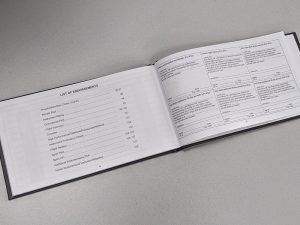 Solo flight at night. If solo flight will be conducted at night, an additional endorsement, 14 CFR 61.87(o), is required. This endorsement certifies that the student has received night training within the 90-calendar-day period preceding the date of flight.
Solo flight at night. If solo flight will be conducted at night, an additional endorsement, 14 CFR 61.87(o), is required. This endorsement certifies that the student has received night training within the 90-calendar-day period preceding the date of flight.
I certify that [First name, MI, Last name] has received flight training at night on night flying procedures that include takeoffs, approaches, landings, and go-arounds at night at the [airport name] airport where the solo flight will be conducted; navigation training at night in the vicinity of the [airport name] airport where the solo flight will be conducted.
Retaking knowledge or practical tests. If a student failed a knowledge or practical test, their instructor must provide further training before certifying that the student is prepared according to 14 CFR 61.49. For a knowledge test, the instructor may complete the endorsement in the space provided at the bottom of the applicant’s Airman Knowledge Test Report (AKTR). For a practical test, The instructor must sign the block provided for the instructor’s recommendation on the reverse side of FAA Form 8710-1, Airman Certificate and/or Rating Application.
I certify that [First name, MI, Last name] has received the additional [flight and/or ground, as appropriate] training as required by Sec. 61.49. I have determined that [he or she] is proficient to pass the [name of] knowledge/practical test.
In Closing…
There are many different endorsements you are responsible for as a flight instructor. It can be easy to get them confused, but it always recommended to refer back to AC 61-65H and the appropriate regulations for clarification. The Gleim Pilot Logbook has the above mentioned endorsements for your convenience. All you need to do is to write the appropriate names, dates, certificate numbers, and a signature. The logbook is included in our Sport and Private Pilot Kits or your can order them individually here.
Written by Ryan Jeff, AGI, Aviation Research Assistant


